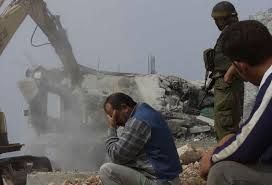
West Bank Demolition At 5-Year High
http://HamiltonfinanceServices.com
As US-backed peace negotiations start up, so do demolitions by Israeli military operations. In fact, the number of demolitions hit a 5-year high today with 663 houses in rubble over the past twelve months. Aid organizations such as Red Cross, Oxfam, and Christian Aid now complain about obstruction and confiscation of their aid at the same time. (http://www.reuters.com/article/2014/02/07/us-israel-palestinians-demolitions-idUSBREA160N620140207)
No one on the Israeli side will comment, leaving observers to wonder whether tensions in Egypt, Syria, and Iraq have emboldened Israel to revisit the 1979 Camp David accords. As demonstrated in the 1967 Six-Day War, preemptive operations by Israel tend to mark their strategies. Even when Israel rules out preemptive strikes, as in the 1973 October War begun on Yom Kippur by Arab forces, it remains a key to most Israel operations. Leading up to such strikes, fomenting civilian actions have historically suggested mounting tensions with potential military ramifications.
Here at HamiltonFinanceServices.com, we have reviewed the 1967 and 1973 war histories plus the activities culminating in the 1979 Camp David accords, to understand what current demolitions signify. Ever since the 1973 October War, a strong political faction in Israel has pressed the agenda of military and intelligence services’ vigilance. The 2009 election of former Prime Minister Benjamin Netanyahu to a second term illustrates the slight leadership control of the right over contemporary Israeli politics. (http://en.wikipedia.org/wiki/Yom_Kippur_War) (http://en.wikipedia.org/wiki/Camp_David_Accords)
(http://en.wikipedia.org/wiki/Benjamin_Netanyahu) (http://www.reuters.com/article/2013/01/22/us-israel-election-idUSBRE90K0FP20130122)
More importantly, tensions across the Middle East may leave open military opportunities for hawkish factions, both within Israel and in the region. Recall that Egypt, Syria, and Iraq were key to Arab war efforts in both the 1967 route by Israel of those Arab forces and the 1973 stalemate imposed by Kissinger shuttle diplomacy. In particular the 1973 October War illustrates how Israel, ready to trounce Arab forces it had surrounded just before peace negotiations halted that war, learned to never again let down its guard. The preemptive nature of Israeli defense from June 5th though the 10th of 1967 remains predominant in war doctrine among Israeli commanders. (http://en.wikipedia.org/wiki/Six-Day_War)
Last months’ announcement of Israel’s Iron Beam (http://www.infowars.com/israel-plans-laser-interceptor-iron-beam-for-short-range-rockets/) leaves some observers wondering about how the Spring of 2014 might blossom on the Sinai and along the Gaza. What do you think?
